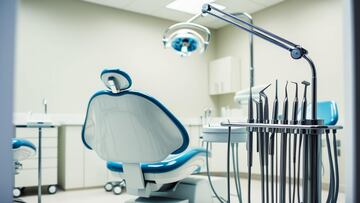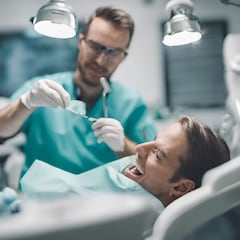Goodbye to teeth loss? This new drug may change trips to the dentist forever
Scientists have identified the protein that is responsible for stopping teeth from regenerating and got to work rethinking our dental care.

It’s National I Love My Dentist Day for those who celebrate. There are many reasons why it’s important to look after your teeth and gums - failing to do so can lead to health problems later in life and the risk of developing heart disease and diabetes.
But the older we get, the more chance there is that we might lose a tooth - whether from an accident, caries, periodontitis or just general wear and tear. And once we lose a tooth as an adult, it’s gone forever - teeth are ectodermal organs - they don’t grow back.
🚨NEW DRUG TO REGROW TEETH ENTERS HUMAN TRIALS
— Mario Nawfal (@MarioNawfal) June 1, 2024
Japanese researchers developed a drug to regrow teeth, set to begin human trials in September.
The drug blocks the USAG-1 protein, which suppresses tooth growth.
Initial trials will involve adults missing a molar, followed by… pic.twitter.com/FV2O2ZyboU
How many teeth do adult humans have?
We develop our adult teeth in childhood between the ages of six to eight after our milk teeth fall out. Most people will have a full set of 28 adult teeth between the ages of 12 and 14. Some will also develop four wisdom teeth - molars which appear at the back of the mouth, one on each side top and bottom.
For those who have lost one tooth or several teeth, implants have been a popular solution over the past few years. Dental implant technology has advanced to such a degree that replacing a lost tooth is now an relatively affordable and painless procedure.
A titanium screw which acts as an artificial root is inserted into the bone with a ceramic crown or a bridge screwed onto it.
NEW DRUG TO REGROW TEETH ENTERS HUMAN TRIALS 😍😃
— Tom Valentino (@TomValentinoo) June 1, 2024
A new tooth-regrowing drug developed by Japanese researchers will start human trials in September.
The drug works by blocking the USAG-1 protein, which stops teeth from growing.
Trials will first test adults missing a molar,… pic.twitter.com/e20MamYM5Y
A new drug that promotes tooth regeneration
Scientists have now discovered a way for teeth to regenerate - something that was previously thought to be impossible. A team of Japanese researchers from Kitano Hospital and Kyoto University have identified the protein that is responsible for stopping teeth from growing back.
The team has developed a drug that deactivates a gene known as USAG-1 which inhibits teeth development in adults. Clinical trials were successfully conducted on mice and last year, the drug was used for the first time on humans.
By suppressing USAG-1, researchers were able to restore tooth formation in deficient mandibles. The intravenous drug is aimed primarily at children with congenital tooth agenesis. However, based on previous findings, it can also be used to treat tooth loss in adults due to certain conditions.
The Japanese research team predict that the treatment will be widely available for everyday consumers by 2030.
Related stories
Get your game on! Whether you’re into NFL touchdowns, NBA buzzer-beaters, world-class soccer goals, or MLB home runs, our app has it all.
Dive into live coverage, expert insights, breaking news, exclusive videos, and more – plus, stay updated on the latest in current affairs and entertainment. Download now for all-access coverage, right at your fingertips – anytime, anywhere.


Complete your personal details to comment